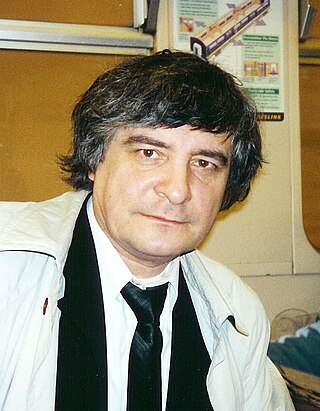Related Research Articles

Milton Byron Babbitt was an American composer, music theorist, mathematician, and teacher. He was a Pulitzer Prize and MacArthur Fellowship recipient, recognized for his serial and electronic music.
Alfred Whitford (Fred) Lerdahl is an American music theorist and composer. Best known for his work on musical grammar, cognition, rhythmic theory and pitch space, he and the linguist Ray Jackendoff developed the Chomsky-inspired generative theory of tonal music.
John Harris Harbison is an American composer and academic.
Mario Davidovsky was an Argentine-American composer. Born in Argentina, he emigrated in 1960 to the United States, where he lived for the remainder of his life. He is best known for his series of compositions called Synchronisms, which in live performance incorporate both acoustic instruments and electroacoustic sounds played from a tape.

Nikolai Sergeevich Korndorf was a Russian and Canadian composer and conductor. He was prolific both in Moscow, Russia, and in Vancouver, British Columbia, Canada.
Richard Danielpour is an American composer and academic, currently affiliated with the Curtis Institute of Music and the University of California, Los Angeles.

William Quincy Porter was an American composer and teacher of classical music.

Volkmar Andreae was a Swiss conductor and composer.
Gustav Strube was a German-born conductor and composer. He was the founding conductor of the Baltimore Symphony Orchestra in 1916, and taught at the Peabody Conservatory. He wrote two operas, Ramona, which premiered in 1916, and The Captive, which premiered at the Lyric Theatre in Baltimore in February 1938. He was also a member of Baltimore's famous Saturday Night Club with H. L. Mencken.

Dmitri Nikolaevich Smirnov was a Russian-British composer and academic teacher, who also published as Dmitri N. Smirnov and D. Smirnov-Sadovsky. He wrote operas, symphonies, string quartets and other chamber music, and vocal music from song to oratorio. Many of his works were inspired by the art of William Blake.
John E. Ferritto was an American composer, conductor, and music professor.
Daniel Asia is an American composer. He was born in Seattle, Washington, in the United States of America.
Robert Cogan was an American music theorist, composer and teacher.

Bethany Beardslee is an American soprano. She is particularly noted for her collaborations with major 20th-century composers, such as Igor Stravinsky, Milton Babbitt, Pierre Boulez, George Perle, Sir Peter Maxwell Davies and her performances of great contemporary classical music by Arnold Schoenberg, Alban Berg, Anton Webern. Her legacy amongst mid-century composers was as a "composer's singer"—for her commitment to the highest art of new music. Milton Babbitt said of her "She manages to learn music no one else in the world can. She can work, work, work." In a 1961 interview for Newsweek, Beardslee flaunted her unflinching repertoire and disdain for commercialism: "I don't think in terms of the public... Music is for the musicians. If the public wants to come along and study it, fine. I don't go and try to tell a scientist his business because I don't know anything about it. Music is just the same way. Music is not entertainment."
Edward Toner Cone was an American composer, music theorist, pianist, and philanthropist.
Steven Roy Gerber was an American composer of classical music. He attended Haverford College, graduating in 1969 at the age of twenty. He then attended Princeton University with a fellowship to study musical composition.
Donald Heins was a Canadian violinist, violist, conductor, organist, composer, and music educator of English birth. He notably founded the first professional orchestra in Ottawa, the Ottawa Symphony Orchestra, in 1902, serving as its director until 1927. He also served in a variety of positions with the Toronto Symphony Orchestra from 1927 to 1949, including concertmaster, principal violist, and assistant conductor.
Roger John Goeb was an American composer.

Tibor Józef Pusztai was a Hungarian violinist, composer, conductor, and teacher. He directed and performed with various orchestras around the world, winning multiple awards thanks to his performances and compositions. Tibor Pusztai died on January 10, 2016.
Ross Bauer is an American composer, conductor, and music educator. A professor emeritus of the University of California, Davis, he was awarded the Walter Hinrichsen Award from the American Academy of Arts and Letters in 2005.